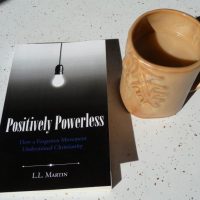
A recent 2-part post was about the historical Jesus versus the Christ of faith. As believers, we see these two things as one and the same, while “liberals” or skeptics do not. Beware that some such theologians or pastors can use the “right words” but may not actually believe much of anything! They see Jesus as an inspirational or challenging example for us, but not much more than that. They spiritualize the miracles in the Bible, and don’t think the miracles actually happened. Jesus “lives” in our hearts or through his teachings, but did not actually raise from the dead bodily. Etc. Read those posts.
I’ll segue here…The historicity of the Gospels are important. It is integral to Christianity. Yesterday I mentioned several books I’ve recently read, and I’ll share two excerpts related to these concerns. (Historicity means that particular events in history actually happened, and are not myth, legend, or fiction.)
In The Consequences of Ideas by R.C. Sproul, in the chapter on Soren Kierkegaard, Sproul makes this important point:
“What is at stake with Kierkegaard’s view of subjectivity is nothing less than the classical Christian view of objective historicity. Christianity affirms crucial events that actually happened, objectively, in the fullness of time. If dehistoricized, Christianity is destroyed. Modern existential theology has taken this to an extreme. These theologians say it does not matter whether or not there was a real historical Jesus. What matters is the existential impact of ‘Easter faith’ on believers.” (page 155-156)
In For the Body by Timothy Tennent, in the chapter on the “sacramental” nature of our bodies (that would need to be explained separately) but in relation to the elements of bread and wine in the Eucharist, states this:
“At the very least, the physical elements of bread and wine are tangible reminders of the physical reality of the incarnation and Jesus’s real sacrifice of his body for the sins of the world. They are also a reminder of the physical reality of the bodily resurrection, which confirms and testifies to Jesus’s victory over sin and death. This is why Jesus’s death and resurrection can never be reduced to a mere symbolic victory that is not rooted in his actual historical, physical death and resurrection. The physicality of the bread and wine remind us of something that truly and physically happened in history. If the body, either our body or the body of Jesus, is regarded as ephemeral and nonsubstantial, this undermines the physical partaking of the sacrament as a sign or pointer to those realities.” (page 102)
Truth matters. Words matter.
I was going to end the post with that, but remembered this from Ruth Tucker about the historicity of Christianity:
“Christianity, more than any other religion, is a historic faith that relies on the credibility of its theological formulations and its Scriptures. Christian beliefs are founded on what is believed to be historical facts – not merely myths or moral stories, as some other religions are. This difference is illustrated by an experience that a friend of mine related about his visit to India. During a tour of a religious site, the guide was telling about the elephant god. My friend asked, ‘Do you really believe there was an actual elephant god?’ The guide seemed perplexed by the question and was unable to give a clear answer; his concept of religious truth was very different than my friend’s. The very nature of Christianity, therefore, makes it vulnerable to attack by those who would try to use its truth claims to prove its untruthfulness. The myth of the elephant god is not threatened by liberal theology or textual criticism. But Christianity, particularly in the modern era, is challenged by its own perceived standard of truth.” (page 119, bold added)
– Shared in this post: Walking away from Faith, part 5, truth claims
♦ Thanks for visiting Enough Light. People are not reading blogs like they used to, so I appreciate that you spent time here. Feel free to “look around” while you are here. Share buttons below. Grace and peace, Laura







